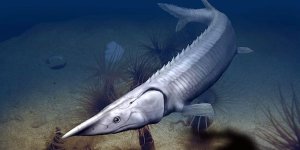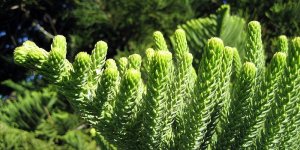Science News

Douglas firs, most abundant trees in North America, will absorb less carbon dioxide. »

Teleportation an important step in improving quantum computing. »

Researchers from the University of Granada are participating in a project that will make it possible (...) »

Comparing epigenetic differences between humans and domestic dogs provides an emerging model of aging. »

Researchers find new clues to where rocky sections of oceanic crust have been hiding. »

Ice core samples provide new evidence of consequences of a massive volcanic eruption in 43 BCE. »

Research explains how a unicellular marine organism generates light as a response to mechanical stimulation, lighting up breaking waves at night. »

When the most massive stars die, they collapse under their own gravity and leave behind black holes. »

Tanyrhinichthys mcallisteri recasts the notion of what it means to be a 'primitive' vertebrate. »

Newly unearthed, well-preserved conifer fossils from Patagonia, Argentina, show that an endangered and celebrated group of tropical West Pacific trees has roots in the ancient supercontinent that once comprised Australia, Antarctica and South America. »

When two black holes spiral around each other and ultimately collide, they send out gravitational waves - ripples in space and time that can be detected with extremely sensitive instruments on Earth. »

Thin film could upgrade a consumer smartwatch into a health monitor. »

Evolution transforms plants into some of nature's best biochemists. »

New model for deep-seated landslides could help stop catastrophes in their tracks. »

Disease outbreaks not confined to humans nor to life on land. »

Thousands of words, big and small, are crammed inside our memory banks just waiting to be swiftly withdrawn and strung into sentences. »

Trees' carbon storage has implications for forest management. »

Indirect contact has implications for understanding disease spread. »

Discovery has important implications regarding development of Maya civilization. »

National Institutes of Health investigators and colleagues have discovered that when the immune system (...) »

Extensive burning in Siberia was a cause of the Permo-Triassic extinction. »

Inexpensive sensor works on minimal power and is 20 times more sensitive than traditional sensors. »

Born from an exploded star, the infant magnetar belongs to a family of extreme objects called neutron stars. »

Hummingbirds can perceive colors that the human eye cannot, thanks to the addition of an extra cone in the hummingbird's eye that we don't possess. »

Permafrost soil types can be predicted based on the surrounding landscape. »

Including a planet's mantle necessary when considering evolution of its surface and life. »

Pockets of landscape less prone than adjacent areas to disturbances such as fire and drought may hold the key for scientists (...) »

An international group of researchers predicts in a new study that by 2050 the world’s mangroves will vanish if the rate of sea-level rise exceeds six millimetres per year. »

Digital displays are lit by surrounding light and look more natural than current displays. »

Satellite data can detect impact on vegetation of fog loss due to climate change. »

Being a "glass half empty" person is not good for brain, according to a new study. »

Highly porous sponge selectively soaks up oil, sparing water and wildlife. »

First research to measure the bioaerosol composition of the Southern Ocean. »

Climate change shifting how plants use water. »

Researchers have identified two brain phenomena that may explain some of the side-effects of ketamine. »

Chicxulub crater may have harbored a vast, long-lived hydrothermal system. »

For the first time, a team of archaeologists has succeeded in mapping a complete Roman city using advanced ground penetrating radar. »

Network of tectonic plates was in place at least a billion years earlier than thought. »

The most common organism in the oceans, and possibly on the entire planet, is a family of single-celled marine bacteria called SAR11. »

Study reveals connection between new experiences, happiness, and increased brain activity. »

Vegetarians are many times told that they may not get enough protein. A concern that can be eliminated with a bit of research based on the USDA food database and RDA. »

Tropical forests contain some of the most biodiverse and dynamic ecosystems in the world. »

Beneath the ocean's surface, a virus is hijacking the metabolism of one of the most abundant organisms on Earth. »

Study supports link between high levels of gram-negative bacteria and a stroke- seizure- and headache-inducing vascular malformation. »

Astronomers using European Southern Observatory (ESO) telescopes have discovered giant spots on the surface of extremely hot stars hidden in stellar clusters. »

Disk observed when the universe was only 10% of its current age. »

Tree pollen remains in the air up to 11 hours after rains. »

Twelve minutes into the flight of the SpaceX Crew Dragon carrying NASA astronauts Robert Behnken and Douglas Hurley, the spacecraft separated from the Falcon 9 rocket’s second stage, signaling the end of the climb to space. »

Polar ice sheets melting faster than previously estimated may result in the oceans rising by as much as 1.3 metres by 2100, according to projections in a new international study. »

Tropical forests can develop resistance to a warmer climate, but 71 per cent will come under threat in the next decade if global average temperatures reach two degrees Celsius above pre-industrial levels, a new study warns. »